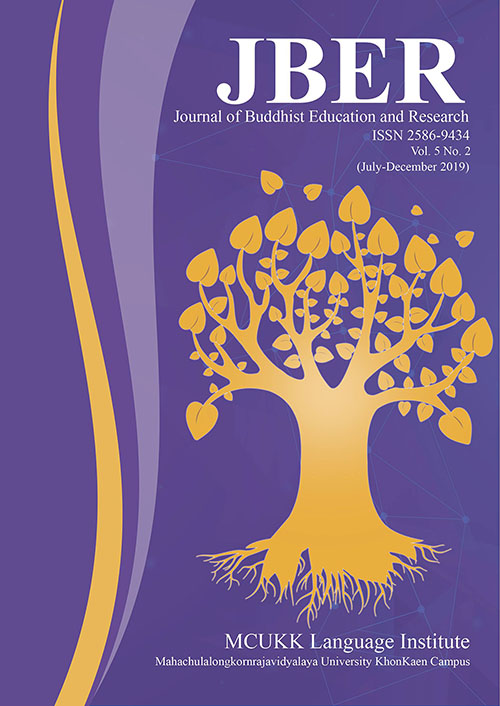THE LEARNING MANAGEMENT OF SOCIAL STUDIES, RELIGION AND CULTURE DEPARTMENT IN ACCORDANCE WITH THE PRINCIPLES OF BRAHMAVIHARA DHAMMA FOR STUDENTS’ VOLUNTEER DEVELOPMENT IN THA BO SCHOOL, NONG KHAI PROVINCE
Keywords:
Development, Student, Volunteer, Brahmavihāra DhammaAbstract
The aims of this research were: to study, to compare and find out the ways of learning management of Social Studies, Religion and Culture Department in developing the students’ volunteer in accordance with the principles of Brahmavihāra dhamma (the Sublime States of Mind) in Tha Bo school, Nong Khai province. The samples of this research included 285 high school students. This study was conducted by means of mixed method research: both quantitative and qualitative methods. The tools used in collecting data were a questionnaire and an interview form. The statistics used in data analysis were: Frequency, Percentage, Mean, Standard Deviation, F-test (One Way ANOVA) and a paired comparison method of Scheffe.
The research results were as follows:
1) The learning management of Social Studies, Religion and Culture Department in developing the students’ volunteer in accordance with the principles of Brahmavihāra dhamma in Tha Bo school, Nong Khai province was statistically rated at a high level in overall perspective.
2) Based on the comparison based on the opinions of the samples, classified by their education, parental occupations and cost of living, the scores of the learning management of Social Studies, Religion and Culture Department for developing the students’ volunteer in accordance with the principles of Brahmavihāra dhamma in Tha Bo school, Nong Khai province were indifferent at the significance level of .05; this denied the prior set hypothesis.
3) The ways of learning management of Social Studies, Religion and Culture Department for developing the students’ volunteer in accordance with the principles of Brahmavihāra dhamma in Tha Bo school, Nong Khai province can be done in the following ways. 1) Volunteer in terms of loving kindness (mettā): students should create volunteer and feel compassion for others, regardless of who they are in the school or in society, good wishes for the others; having kindness will give them the power of attraction and love of their surrounding people. 2) Volunteer in terms of compassion (karuṇā): students should create volunteer to help those in need to overcome suffering without having to think that whether that person is a good person or a bad person; students with mental needs to help, this is considered a merit from compassion; this creates happiness and joy of being free of other person's suffering. 3) Volunteer in terms of sympathetic joy (muditā): students should create volunteer by encouraging them not to be jealous; without jealousy, it leads to the promotion and support of happiness or goodness to remain and prosper. 4) Volunteer in terms of equanimity (upekkhā): students should stay physically, verbally and mentally calm for being abused and insulted; they should forgive anger, envy, gossip that naturally happen; the minds should be neutral and calm as whoever does evil, gets bad outcome according to the law of karma.
References
เจริญ ภักดีวนิช. (2010). การจัดการนักศึกษาเพื่อพัฒนาคุณภาพชีวิตและแก้ไขวิกฤตการณ์ทางสังคม. กรุงเทพฯ: สำนักพิมพ์พิมพ์ชวนพิม.
ดวงทิพย์ อันประสิทธิ์. (2555). รูปแบบของการขัดเกลาทางสังคมเพื่อเสริมสร้างจิตวิญญาณชุมชน: กรณีศึกษาชุมชนบางน้ำผึ้งอำเภอพระประแดงจังหวัดสมุทรปราการ. วิทยานิพนธ์ปริญญาโท. บัณฑิตวิทยาลัย: สถาบันบัณฑิตพัฒนบริหารศาสตร์.
พระครูสมุห์อนุกูล อนุวฑฺฒโน. (2555). ความคิดเห็นของประชาชนที่มีต่อการนำหลักพรหมวิหาร 4 ไปใช้ในการบริหารงานขององค์การบริหารส่วนตำบลม่วงงาม อำเภอ
สิงหนคร จังหวัดสงขลา. วิทยานิพนธ์พุทธศาสตรมหาบัณฑิต. บัณฑิตวิทยาลัย : มหาวิทยาลัยมหาจุฬาลงกรณราชวิทยาลัย.
พระมหาธาตุ ปิยธมฺโม. (2560). การจัดการเรียนรู้สำหรับผู้เรียนอาสาสมัครในสังคมศึกษาการเรียนรู้ศาสนาและวัฒนธรรมโรงเรียนมัธยมศึกษาตอนปลายอำเภอโพนพิสัย จังหวัดหนองคาย. วิทยานิพนธ์มหาบัณฑิต. บัณฑิตวิทยาลัย: มหาวิทยาลัยมหาจุฬาลงกรณราชวิทยาลัย.





